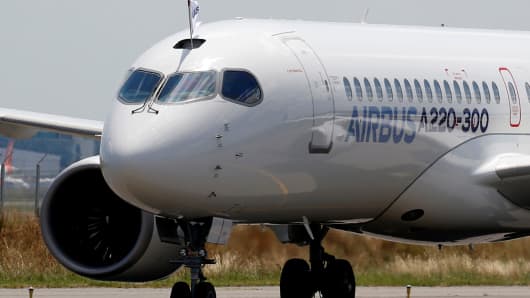The EU has hit back at new U.S. proposals to target European goods with tariffs, following a World Trade Organization (WTO) ruling over subsidies for Airbus.
Trade tensions between the EU and U.S. flared Monday after the U.S. said it’s considering $11 billion worth of retaliatory tariffs on a range of goods in response to illegal subsidies the EU granted to the aerospace firm.
The WTO ruled last year that these allowances had caused “adverse effects” to the U.S., with the decision coming after a long-running litigation battle between the Washington and Brussels over their respective aviation giants.
Shares of Airbus were trading 2.3% lower Tuesday after the tariffs were proposed. A spokesman for the company said there is no legal basis for the U.S. move to impose sanctions, and said the EU had complied with WTO rulings. A source at the European Commission, who preferred to remain anonymous, criticized the proposals.
“The EU is confident that the level of countermeasures on which the notice is based is greatly exaggerated. The amount of WTO authorized retaliation can only be determined by the WTO-appointed arbitrator,” the source told CNBC.
On Monday, the Office of the U.S. Trade Representative said it would slap tariffs on EU goods ranging from aircraft to fish, dairy products to binoculars, olive oil and wine, according to a preliminary list.
It said it estimates “the harm from the EU subsidies as $11 billion in trade each year,” although the amount is subject to an arbitration at the WTO, the result of which is expected to be issued this summer.
“This case has been in litigation for 14 years, and the time has come for action. The Administration is preparing to respond immediately when the WTO issues its finding on the value of U.S. countermeasures,” U.S. Trade Representative Robert Lighthizer said in a statement Monday.
Double standards
Both sides have now been found guilty of paying billions of dollars of subsidies to gain advantage in the global aircraft manufacturing business.
The EU is still waiting to hear from the WTO about what “retaliation rights” it has after the organization found in 2012 that Boeing too had received billions of dollars in illegal subsidies that had been to the detriment of Airbus. The WTO also ruled in March that the U.S. had failed to comply fully with its earlier ruling to remove all illegal subsidies that Boeing had received.
The European Commission source also signaled Tuesday that Brussels is ready to retaliate in kind, noting that in the parallel Boeing dispute, “the determination of EU retaliation rights is also coming closer and the EU will request the WTO-appointed arbitrator to determine the EU’s retaliation rights.”
Some analysts have accused the U.S. of double standards. GAM’s Investment Director for Global Equities, Ali Miremadi, said the U.S.’ tariff proposal was “quite bold.”
“I have to say the country which is the home to Boeing accusing Europe of state subsidies for Airbus — this is quite bold,” he told CNBC’s “Squawk Box Europe” Tuesday.
“It’s very well established that both Boeing and Airbus exist only at the discretion of their respective hosts or host governments.”
Dark clouds
The latest U.S. threat comes as tensions are already simmering with the EU over possible tariffs on its cars and auto parts. A final decision has not yet been made.
The U.S. is currently negotiating with China over a trade deal after almost a year of escalating retaliatory tariffs on each other’s imports. Europe could be next in line for some rough treatment.
“Even once we are done with the U.S. and China, the U.S. will turn to Europe,” Laurence Boone, chief economist at OECD, told CNBC’s Steve Sedgwick at the Ambrosetti Workshop in Italy on Friday.
“So, I think by undermining the multi-lateral rules-based system on trade, we have just injected a massive dose of uncertainty in the world that will stay with us for a long time.”
Strategists warn that tariffs could not come at a worse time for the EU, with growth and industrial production looking vulnerable. Tariffs “are still a very important dark cloud when it comes to European growth,” Luis Costa, head of CEEMEA FX strategy at Citi, told CNBC Tuesday.
“This is coming at a time when German factory orders are down by 4 to 5 percent and output is still in danger, some of those regional manufacturing indices are still in contraction territory, so this is coming at a very delicate time,” he told CNBC’s “Squawk Box Europe.”








